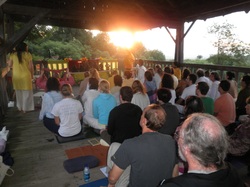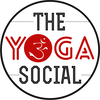- Home
-
Trainings
- Adelaide 200hr Yoga Teacher Training 2024
- Adelaide 200hr Yoga Teacher Training 2025
- One on One Yoga Teacher Training
- Rest and Restore YTT
- Senior Chair YTT - Brisbane
- Senior Chair YTT - Adelaide
- Senior Chair YTT - Melbourne
- Meditation and Mindfulness TT
- Online 200hr Yoga Teacher Training
- Online Post Graduate Yoga Teacher Training
- Classes and Prices
- Studio Hire
- Chair Yoga Australia
- One on One with Beeks
- Events & Happenings
- Team, Contact & Location
 I've had many students ask me recently for advice regarding teacher training. Usually, they want to go somewhere exotic (India, Bali ....etc), something quick, easy and cheap. Most want it now. Not next year or in 5 years time. Now. Because most of them have been practicing Yoga daily or weekly for 5 (or longer) years so they've been on that yoga journey for what seems like a lifetime! Finally, they've made the decision to change their career, to change their life. We live in a society where most things are easily and quickly accessible. So why can't a Yoga teacher training certificate be too? I won't go into the lesson of patience. That's another blog entry. Lucky for them .. there are HEAPS of short Yoga teacher training courses that give you the required 200 hours up your sleeve so you can register with Yoga Alliance (if the course is Yoga Alliance approved). I won't go into whether I think 200 hours is long enough. That's yet another blog entry. Courses range from your standard 4 week intensive 200 hour teacher training courses set amongst the rice fields of Ubud, to your 12 month part time one night per week course at your local studio (usually 500 hours). I've heard of 12 day teacher training courses at a beach resort somewhere, then you do the rest of the hours at home and submit the work before you get your certification. Then there are those few styles (very respected) where you seem to be training your entire life, you're examined each year and are still considered a 'junior'. I'm currently in the process of writing a Yoga teacher training course. Mine won't be ready for probably another 12 months or so because it's a long process and I want to do it well. I've had the opportunity to take a look at many courses recently (market research .. as you do) and I've got to tell you ... some are awesome, some not so great. So how do you know which course is best for you (before spending $3500 which is the average price)? Firstly, I think it's really important to focus on the class/style you connect with. Ask the teacher who was responsible for turning you into the 'yoga junkie' you are today. If that teacher instructs a certain style of yoga, for example, Anusara, then it's easy. Go to an Anusara immersion. If the instructor teaches a mixture of many approaches and styles for example, he starts the class with a power flow sequence then follows with a restorative seated practice, then it's not so easy. If this is the case, I recommend you have a think about the kind of person you are. Are you an alignment focused person who would simply love a 90 minute class on deconstructing the triangle pose? Are you an athletic person who loves to sweat and move - the more chaturangas the better? Do you love it when your instructor tells stories about Ganesha the elephant god and the Yoga sutras? Is your favourite class of ALL TIME the one when you realised something powerful about your emotional self? Are you a mixture of a few of these? These questions will help to shape the kind of instructor you want to be. You can narrow your list down from here. Chances are, if you love practicing a certain approach .. you'll love teaching the same way. For example, you love your instructor's classes when you jump, sweat and constantly move and you're not really into the cover/sub instructor who tells you to open your heart and let yourself cry. You may want to check out some of the Vinyasa teacher training courses on offer. Another example, you're in a state of bliss when your instructor does the chanting at the beginning and the end, you are so interested in Ganesha to the point that you bought a book about him and in the asana class you need to take your time. You may want to go for something more classical Hatha because they offer an equal balance of all disciplines in their training (including meditation, philosophy chanting etc). I'm a big fan of word of mouth. Ask around. Ask your teachers. Ask the reception desk. Email instructors you love. Ask bloggers :) There are so many different teacher training courses available so make sure you check out the accreditation. Is it Yoga Alliance, or Yoga Australia (or similar) approved? It's not the 'be all and end all' to be registered with one of these industry bodies but personally, as someone who hires Yoga teachers, it at least gives me some indication, if I don't know the school you've trained at, that your certification meets the industry standards. Registration will also help you get insurance and if you are lucky enough they offer short courses for Yoga teachers, they remind you when you need to update your CPR and hold regular gatherings. Once you do your first Yoga teacher training, you'll be hooked. I've recently completed my 4th Yoga teacher training (not to mention all the short courses and workshops). A rant to finish up. I hear of peeps deciding they want to change their career/life to be a Yoga teacher when they don't practice Yoga themselves. Someone telephoned me for advice on Yoga teacher training and she had NEVER been to a Yoga class in her life! Although it's admirable to come to the realisation that something needs to change in your life, I would recommend you put it off for a bit ... find yourself a good Yoga teacher and practice Yoga regularly for at least a few years (many would disapprove of my advice and say at least 5 years). Your decision could change after this... because it is really hard work. I think it's best to experience this discipline mentally, emotionally and physically before you can talk the talk, respect what your students are going through and fully respect the Yoga way of life. Om Om Om, Ambika
4 Comments
3/1/2017 09:23:24 pm
The ability to do Chin Mudra was one of the milestones of human achievements as this led to a greater co-ordination of the fingers. The ability to perform a lot with fingers had bought a confidence and changed the approach of the human being towards life.
Reply
Your comment will be posted after it is approved.
Leave a Reply. |
AuthorThe Yoga Social Team Archives
March 2019
Categories |
- Home
-
Trainings
- Adelaide 200hr Yoga Teacher Training 2024
- Adelaide 200hr Yoga Teacher Training 2025
- One on One Yoga Teacher Training
- Rest and Restore YTT
- Senior Chair YTT - Brisbane
- Senior Chair YTT - Adelaide
- Senior Chair YTT - Melbourne
- Meditation and Mindfulness TT
- Online 200hr Yoga Teacher Training
- Online Post Graduate Yoga Teacher Training
- Classes and Prices
- Studio Hire
- Chair Yoga Australia
- One on One with Beeks
- Events & Happenings
- Team, Contact & Location

 RSS Feed
RSS Feed